AI for personal use: help with education, work and planning

Against the background of news in the field of AI, ordinary startups are somehow lost. Research on machine learning (computer vision, natural language processing, etc.) is growing exponentially at arxiv.org. Alphago zero enslaves the earth crushingly defeats past versions of the network and does not require human participation in the training process. NVIDIA's neural network changes the time of year and weather conditions to a photo, and the craftsmen use the algorithm laid out to change actress films for ... other actresses.
How to remain viable with the news on AI? At one time, Ray Kurzweil predicted: “In 2029, the program will not only be able to fully pass the Turing test, but will do it better than many real interlocutors. A computer for a thousand dollars will be orders of magnitude greater than the average person’s brain in most areas. ” However, now experts say that there are chances to get a strong AI “within 5 years with a probability of 80% and within 10 years with a probability of 99%”.
Probably, in the next 5-10 years, the fate of humanity can be decided. Is it worth it in such conditions to deal with an AI project at all, if its goal is not to create intelligent robots? There is no exact answer to this question. But the boom of projects solving applied problems continues. Today we look at the three spheres of application of AI, where interesting results have already been achieved.
Education
Woogie. An interactive robot that makes learning fun for kids.
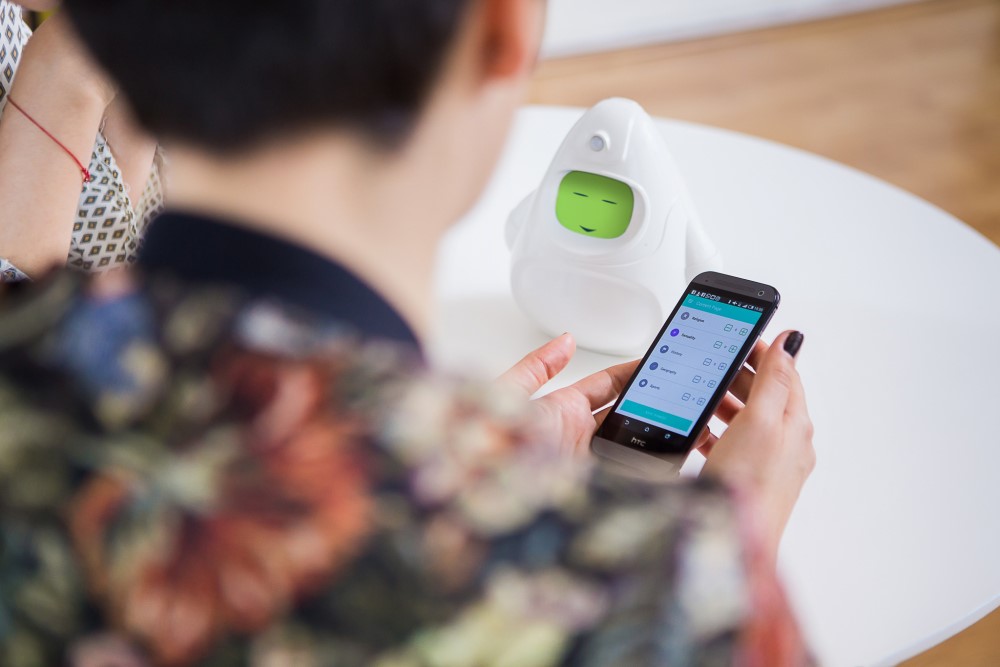
The Woogie robot teaches children between the ages of 6 and 12 years of age through a voice interface. The robot entertains, teaches, gives answers to some questions, and it costs only 76 dollars. Woogie refers to the service database to answer any child’s question: from “Why did the dinosaurs disappear?” To “Why do I need to eat broccoli?”.
Learning is not only a child. The robot itself is constantly learning individual interaction, adapts to the habits and interests of each child. He is able to tell a joke, to make a riddle, to attract the attention of a child with a fairy tale. Parents have access to the system through a mobile application and can upload new content to the database, such as books and educational games.
In many ways, the project is unusual. He does not have his own token, he does not go to the ICO, and receives money for development from the crowdfunding program on Indiegogo. At the moment, 30 protitopes of the device have already been prepared.
AltSchool. Platform of new teaching methods

In 2014, a new education project attracted $ 33 million. In 2015, AltSchool attracted another $ 100 million. The startup interested investors with an unusual approach: AltSchool is a series of micro-schools that focus on individual learning. Students receive their own weekly “playlists,” lists of individual and group activities, adapted to the specific strengths and weaknesses of each child. AltSchool tracks the progress and failures of each student - every step in his path, all the strengths and weaknesses. The software gives recommendations that influence the educational process of each child.
A research project organized by the Gates Foundation explored the impact of personalized teaching practices in 23 public schools. Two years later, a study showed that students in these schools achieved more success than students from comparable schools that did not have a personalized curriculum. Moreover, the study showed that the students whose grades grew the most were those who had lagged far behind in many subjects.
Add to the personalization capabilities of the software that adapts the curriculum for each individual student, and you will understand what education will look like in the future.
Hugh. Helps library visitors quickly find any book.

Students seeking library books at the University of Aberystwyth (UK) may seek help from a robot librarian. Hugh - the world's first robot, designed to work in the library. He can tell where the book is stored and show the student the appropriate bookshelf.
Receiving information from PRIMO, the university’s online library, Hugh has access to 800,000 books. Hugh responds to voice commands and is able to deal not only with books. Such robots will be able to perform specific tasks in hospitals, supermarkets or hotels.
Knewton. Adaptive learning
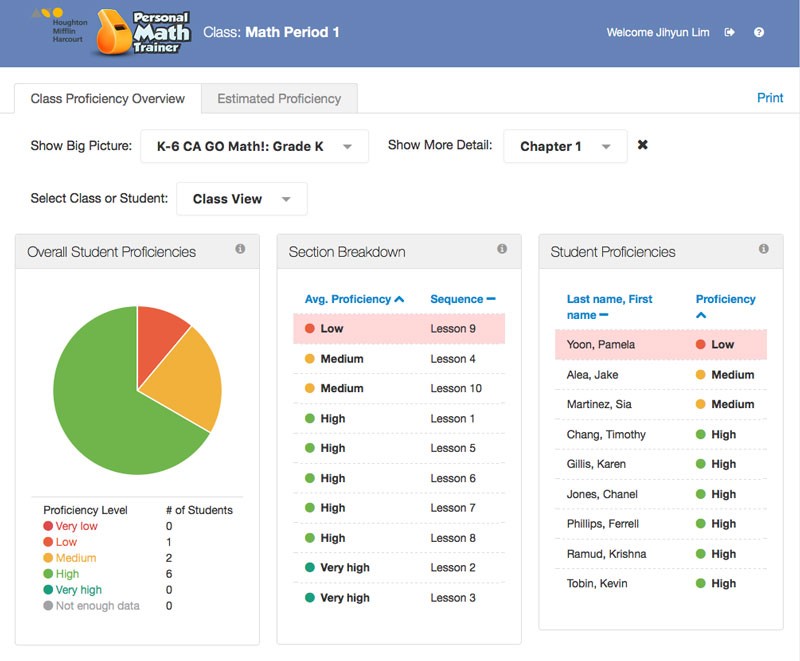
Gathered $ 157 million in investment, Knewton has developed an adaptive educational platform based on data analysis technologies in the field of education, and offers to integrate its solution with any educational process management system. The adaptive platform provides recommendations for student learning based on student performance, and also offers an analysis of digital content. With the help of software, a teacher evaluates a student’s knowledge of his subject at any one time. If the student is not good at the subject, Knewton can offer content that increases the level of understanding of complex issues. Knewton will offer different options for educational content until it finds a way to teach the student.
Although many learning platforms can boast that they correct test questions in class based on previous answers, the Knewton data management process is fundamentally different because it offers a hyper-personalized learning option created on the fly for each specific user. Today, Knewton employs more than 13 million students worldwide, and the platform’s database contains over 100,000 educational materials, including video lectures and study guides.
Personal assistants
Fin. Personal assistant for all issues

Fin is a twenty-four-hour help service that is similar to Siri, Echo or Google Now in everything ... except what really works. Fin uses a combination of machine and human intelligence (hired assistants monitor the processing of requests) to find answers, send messages, process orders and do everything you expect from a personal assistant.
Fin accepts orders in a mobile application, by e-mail, via SMS or online chat. You can ask Fin to call, make purchases, send a text, notification of a meeting or a book by e-mail. You can use Fin to transcribe audio or video to text, or simply find answers to the questions you asked.
Gatebox Holographic anime assistant
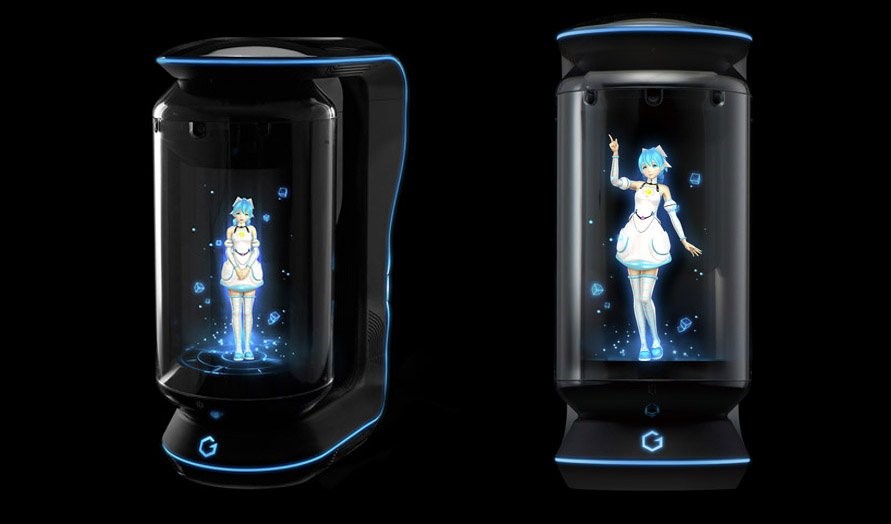
Gatebox is a device that provides a demonstration of an image of a girl with blue hair named Azuma Hikari. Gatebox has sensors and a camera that help the system identify the face and movements of the wearer. You can control the device with the help of voice, automating the house in various ways: turning the lights on and off, setting an alarm clock or just talking to Azuma, which welcomes you and reminds you of various things.
Azuma can even send angry messages to the host if he is delayed, explaining that she "feels lonely." However, for the opportunity to communicate with the virtual girl will have to pay a lot - the cost of the Gatebox is about $ 2,580.
Hound Casual Assistant

The Hound application, available on both iOS and Android, recognizes voice commands (including search queries), translates sentences into other languages in real time, and even understands the contextual connection between several requests. The latter is worth discussing in more detail because Siri and Cortana stumble at this point. Any of your search queries can be easily refined by subsequent questions, so you do not need to repeat it again. If you are looking for a suitable hotel, then in order to narrow the search from all the options found, ask for "a room with Wi-Fi" or "with a gym."
Hound finds a cafe with free Wi-Fi just a few minutes walk from you, shows all hotels costing between $ 200 and $ 400 per night in a specific area of the city, and reflects the time of sunrise two days before the New Year. And if you ask Hound how many calories are contained in 16 apples and 4 bananas, he will call the total calories for all fruits. Hound can also tell you how much the cheapest trip to Uber will cost you.
According to the developers of SoundHound, which for 10 years received $ 75 million of investment, all other digital assistants translate what you say into the text, and only then analyze the meaning of the information, while Hound skips this step and immediately decrypts your speech .
Hound does not use Google search, therefore sometimes it is strangely mistaken on simple queries. For the most part, the application is now sharpened by a search for establishments, answers to “strange requests” and for on-the-fly transfers.
Mycroft. The world's first open source robotic assistant

Here is a hub device based on the Raspberry Pi 3 and Arduino, inspired by the design of robots from sci-fi movies. The Mycroft project on Kickstarter raised over $ 127,000 and another $ 160,000 on Indiegogo. The system is designed on the Snappy Core Ubuntu platform (designed for home automation systems, drones and autonomous robots) and is able to process user commands in natural language. Mycroft's idea is to allow users to use any type of device — desktop computers, mobile devices, speakers, robots — anything that can come in handy when processing natural language.
Mycroft can report news, talk about the weather, and manage other devices around the house or in the office — for example, include a coffee maker or play a specific music playlist. Thanks to the open platform Mycroft, new features constantly appear in the system. Innovations are limited only by the imagination of the developer and can include anything from control of an unmanned aerial vehicle to answers to questions about pokemon.
Remi. Siri with a nice interface
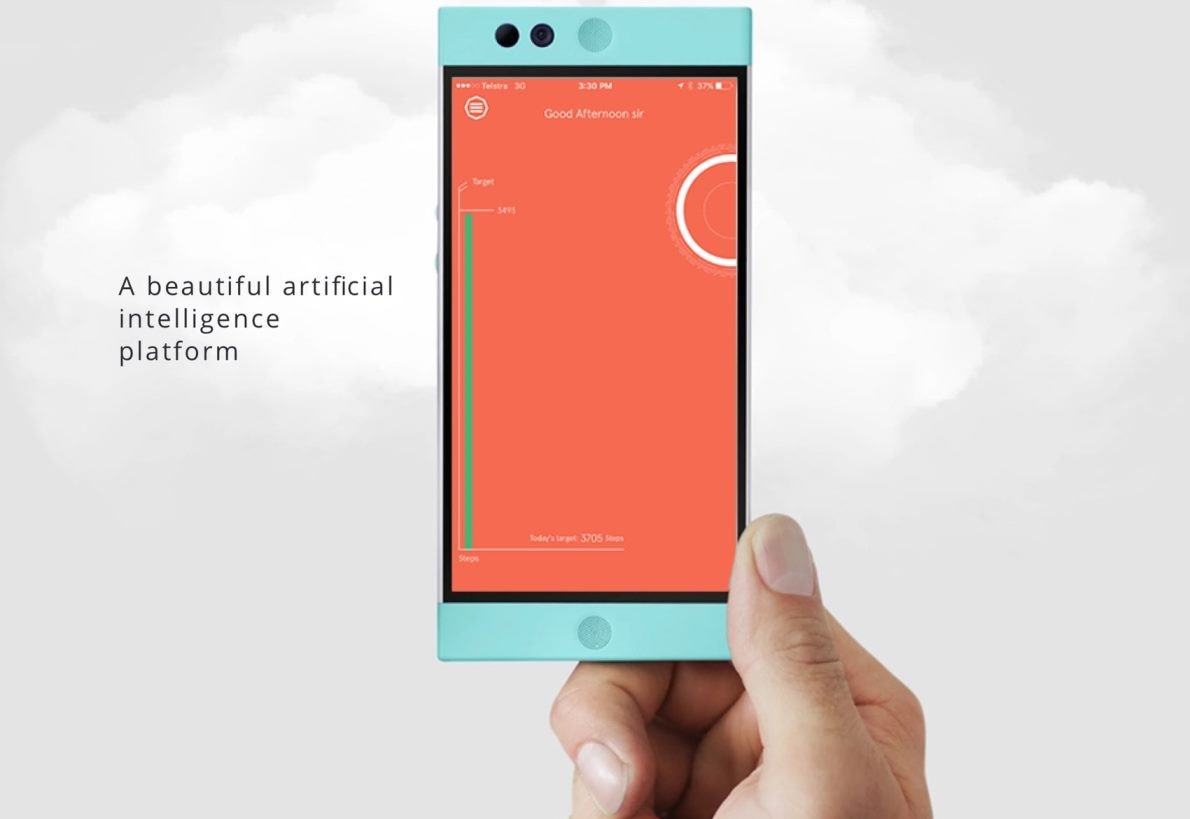
Remi's virtual assistant may one day become a true AI - the developers are confident that they set themselves an ambitious task not just to make a personal assistant, but to build a full-scale AI that speaks, thinks and, most importantly, learns. Now Remi can not be called particularly clever - he did not even get to the level of a dog.
Viv. Connected Assistant

Viv does not just refer to a web search, but is itself associated with a variety of services, which allows the application to find answers to user requests faster and more accurately. Viv can buy goods, use x.ai to schedule meetings and even send requests to book a hotel room or order flowers. Viv can understand the user's intention and create an algorithm for processing the task on the fly, even if such a task has never been encountered before. An application can display the processing code for each request. This hypothetically enables third-party developers to create a reliable interactive interface for their services, simply by talking to Viv.
The creators of Viv - Doug Kittlaus, Adam Chayer and Chris Brigham - have been working on the problem of learning natural language for over ten years, participated in the creation of Siri, as well as in the project for developing AI under the auspices of DARPA in the early 2000s. Not surprisingly, with such a background, Samsung agreed to acquire this virtual assistant. Viv continues to operate as an independent company, but now provides all of its services to Samsung.
Professional assistants
Clara. Scheduling meetings
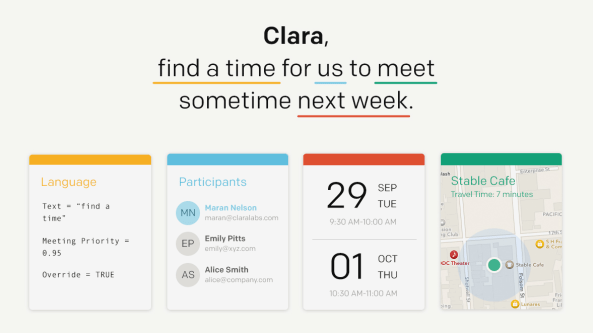
Clara Labs received a $ 7 million investment to create an intelligent assistant that meets the needs of business users. Clara can automatically schedule meetings, independently choosing the most suitable places and times for you. Although the task of booking a conference room seems very simple, Clara makes many decisions — for example, trying not to get on the dates when you usually take a vacation. Clara not only organizes meetings, but also plans calls, lunches, time for a coffee break.
Clara, integrating with Slack, CRM and other systems, changes the planning model in the enterprise from department to department. Obviously, developers and vendors need a different number of meetings (and, possibly, at different times) - the assistant takes these nuances into account.
Julie Desk. Event Planning Assistant
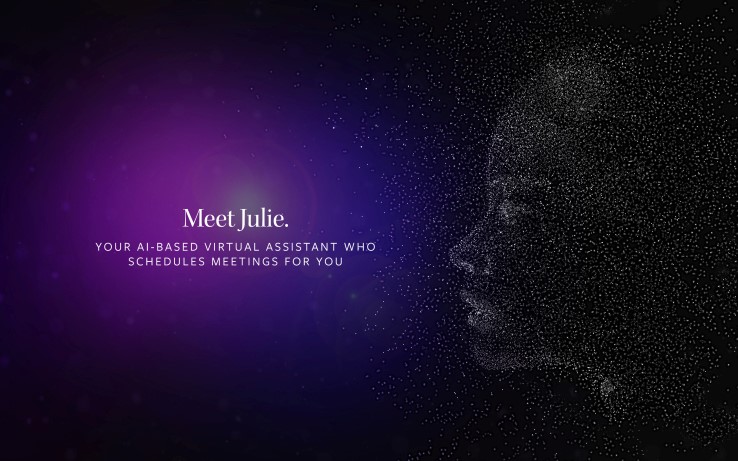
The Julie Desk interface is your email. Julie receives letters from you, and then, like a regular secretary, she looks into your Google, Microsoft Exchange or iCloud account to select the most optimal time and place. He confirms your data, adds the meeting to his schedule and sends an invitation to all participants.
The French startup attracted 2.5 million euros, but one cannot say that the company managed to create a full-fledged smart system. Each step of the AI is supported by continuous observation of the human assistant. According to the founder Julie Desk, observation is necessary for quality assurance, which is especially important for large corporate clients.
Kono. Bot scheduler
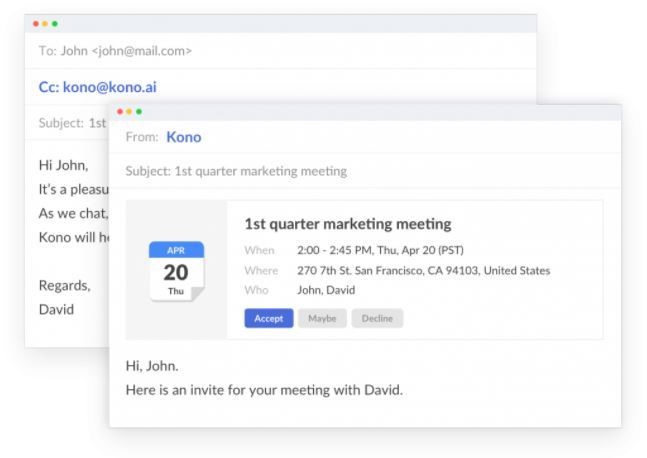
Not everyone has a personal secretary to manage their schedule and organize meetings at the most appropriate time. But the Kono smart bot, developed by the South Korean technology start-up Konolabs, can bring meetings into the calendar for each user. Kono extracts planning-related keywords from your email to see when you want to meet. Moreover, the bot analyzes even such vague statements as "we can meet sometime next week" or "let's hold a conference on Tuesday or Thursday."
Then the bot organizes a meeting at a time that is optimal for you, as well as for the person with whom you want to meet. Even if you schedule a meeting with several people, including those who live in different time zones, Kono will notify you of the time that is best for everyone.
The official trial version is available for free to anyone using the Google Calendar, G-Suite and Microsoft Office 365.
Evie. Premium assistant
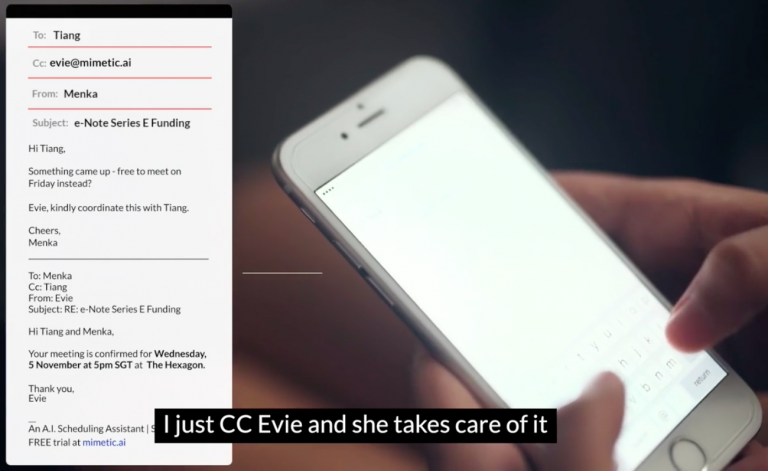
A Singaporean startup (previously called Mimetic) launched the Evie assistant, who, according to developers, saves more than 4 emails needed by the average manager to coordinate the meeting. Evie also offers premium features for business. These include the ability to work in the corporate domain, view the availability of staff and coordinate the logistics of booking conference rooms.
Evie’s “open-source” technology, SyntaxNet, is based on Google’s TensorFlow neural network and Stanford CoreNLP, an open-source library that provides a set of word processing tools (in natural language).
X.ai. Virtual assistant, self-coordinating meetings with partners
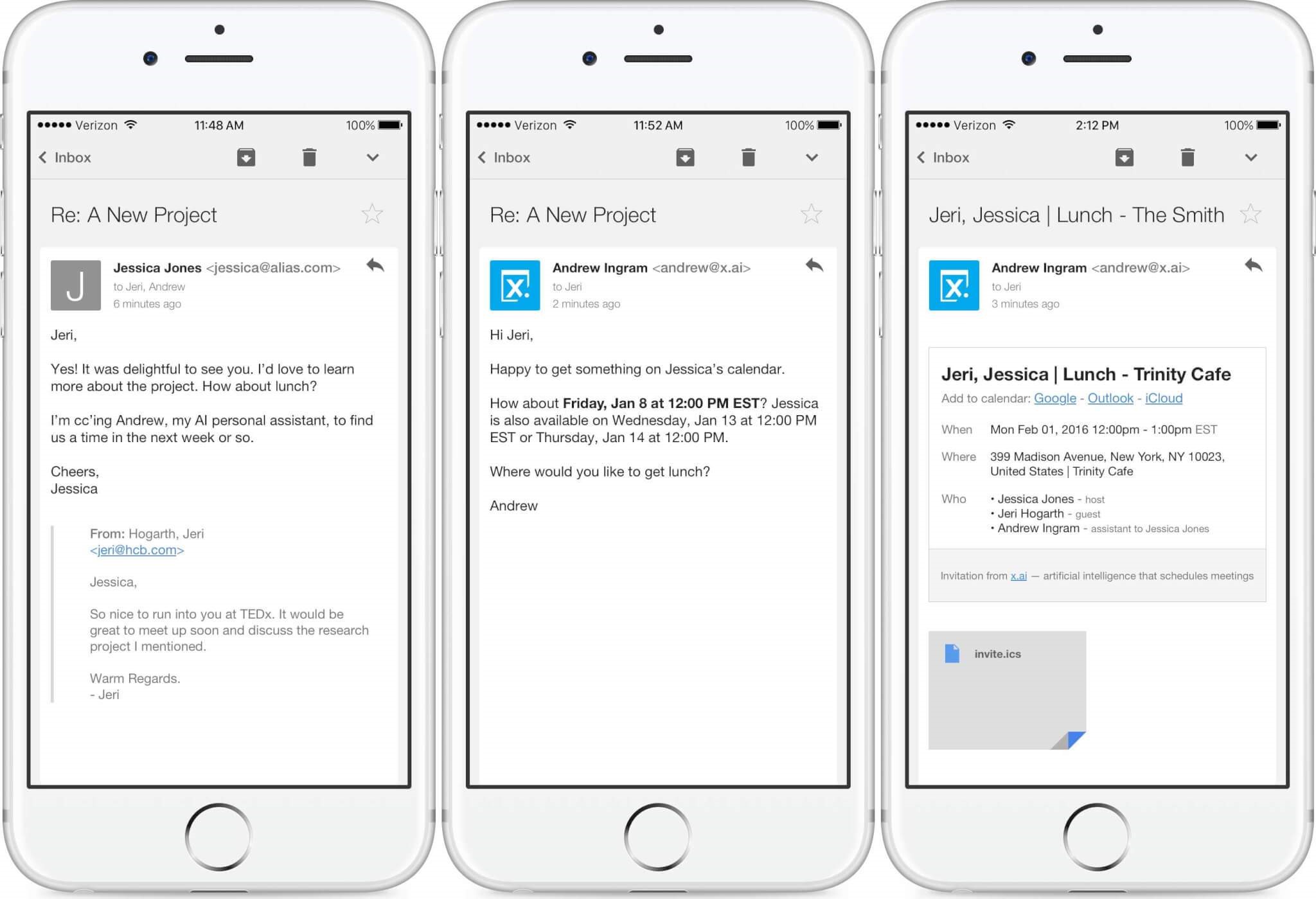
Personal assistant X.ai only need to specify in the copy of the letter to his interlocutor, so that the bot began independently planning the meeting. The bot learns from the interlocutor when it is convenient to meet him, and makes an appointment at a convenient time for both parties.
The basic version of the service, which allows you to schedule five meetings per month, is provided free of charge. The cost of the company X.ai is now estimated at $ 100 million.
Zoom.ai. Help in work
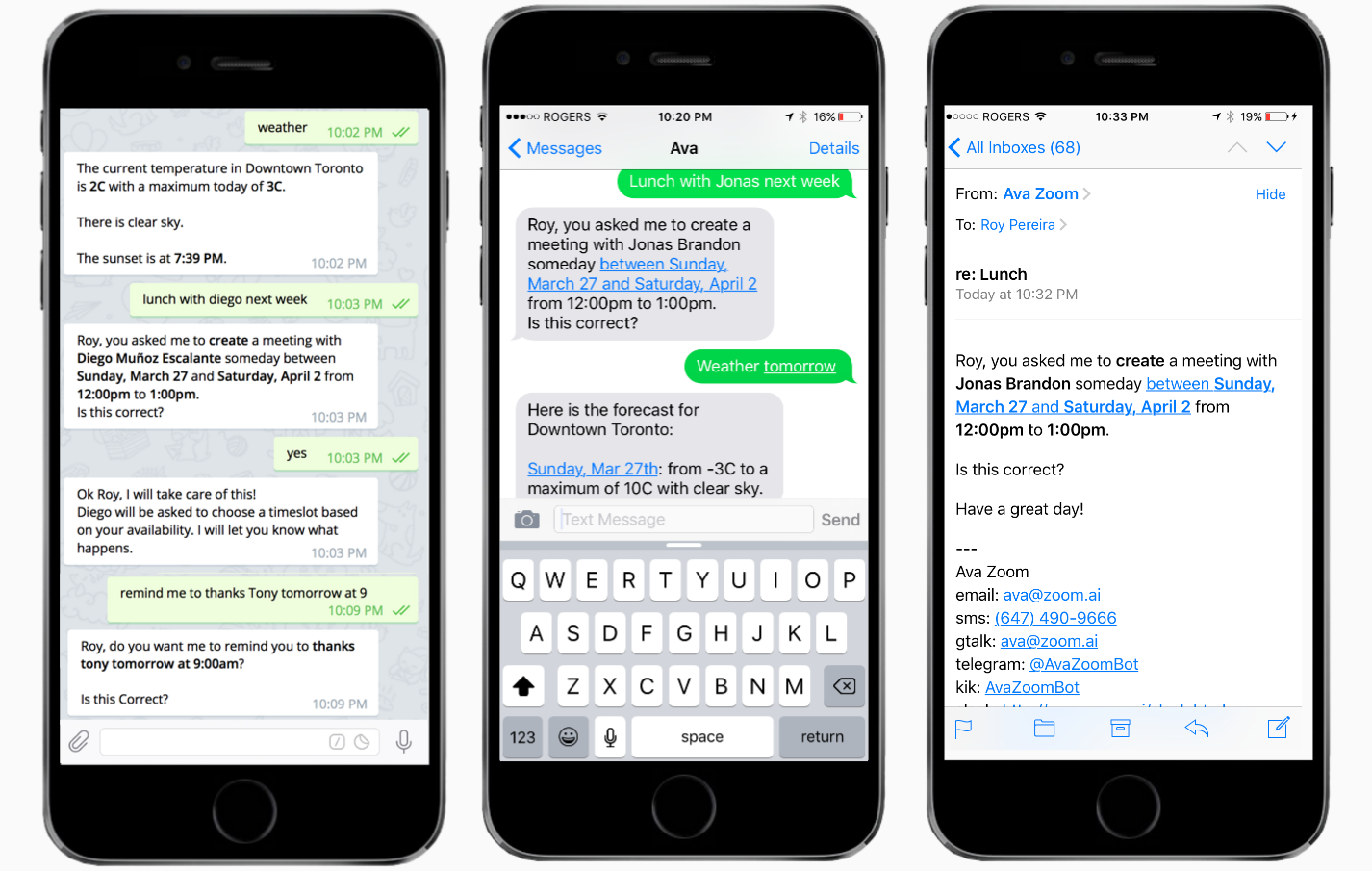
Zoom.ai offers an integrated approach that differs from standard chat bots: planning, searching for contact information, deciding where to drink coffee, searching for any background information about a potential contractor - a list of things that the service can do automatically . Zoom.ai can understand the meaning of what is written in natural language and even recognize Emoji used instead of words.
Currently, a startup has 60,000 individual users and several dozen corporate clients.
Competition in the application of AI is increasing. Increasingly, start-ups appear in the same niche — one good idea should arise, as clones and copies follow. But it is in such a competitive environment that the most valuable projects are born and survive. In December 2017, IBM published more than 120 code templates for quick launch of projects related to artificial intelligence, blockchain, cloud data and other areas. And this means that creating your own AI project becomes easier than ever.
Each template contains a detailed description of the tools and a link to the repository on GitHub, where you can see the codes and get acquainted with the documentation. Next year, we can expect an exponential growth of various projects - from planning meetings to global revolutions in biotech and fintech.
All Articles